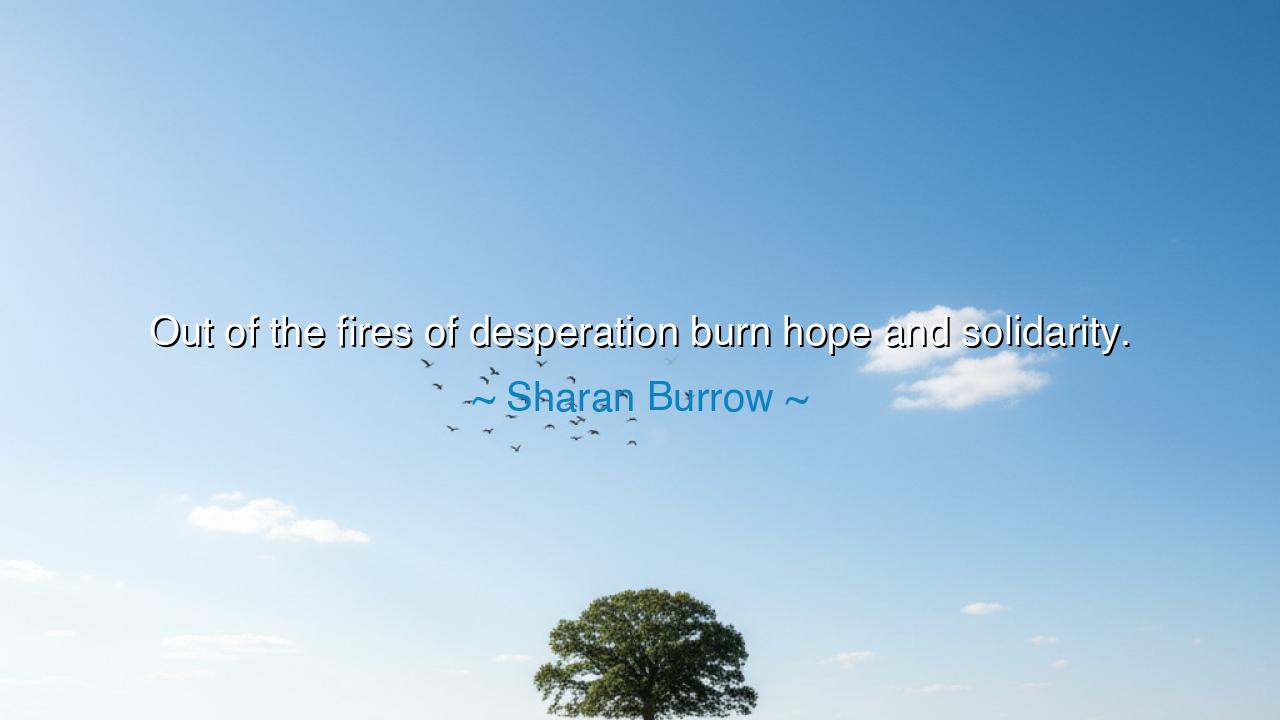
Out of the fires of desperation burn hope and solidarity.






“Out of the fires of desperation burn hope and solidarity.” Thus spoke Sharan Burrow, a leader and champion of workers, whose words rise like a banner over the struggles of humanity. In this brief and blazing sentence, she captures an eternal truth—that in the darkest moments of suffering, when all seems lost, the human spirit does not extinguish. Instead, it ignites. From the ashes of despair, there emerges hope, and from the shared burden of pain, there is born solidarity. These are not fragile emotions, but forces as ancient as civilization itself—flames that have carried generations through oppression, war, and injustice.
When Burrow speaks of fires of desperation, she evokes the crucible of hardship—the trials that test the limits of endurance. Desperation is not a gentle fire; it is fierce, consuming, and relentless. It represents those moments when hunger gnaws, when injustice suffocates, when human dignity is trampled beneath the feet of power. Yet, paradoxically, it is within this fire that new strength is forged. Just as iron becomes steel through flame, so too does the human heart find its courage through suffering. Burrow reminds us that desperation need not destroy—it can purify, awaken, and transform.
The origin of such wisdom lies in the great struggles of human history. Sharan Burrow, herself a leader of the global labor movement, speaks not from theory but from the front lines of human endurance. Her words echo the chants of factory workers who, despite poverty, demanded justice; of farmers who tilled dry earth with the faith that rain would come; of entire peoples who rose from the ruins of war. When she speaks of hope and solidarity, she is naming the two pillars upon which every great act of renewal has stood: the hope that life can be better, and the solidarity that makes that hope achievable.
To see this truth clearly, one need only recall the story of the Polish workers’ movement of the 1980s, known as Solidarność. In the shipyards of Gdańsk, under gray skies and the shadow of tyranny, ordinary laborers found themselves caught between despair and defiance. They had little food, few rights, and no guarantee of victory. Yet in their desperation, they discovered unity. They gathered, not in comfort, but in courage. Their leader, Lech Wałęsa, understood that power lies not in wealth, but in collective will. Out of the fires of oppression, hope burned—small at first, but growing brighter with each act of solidarity. And in time, that flame helped to bring down a regime and reshape a continent.
Such is the pattern of history: where there is oppression, there too arises resistance. The fires of desperation that threaten to consume us are also the very forces that can illuminate our path. For when one person stands against despair, it is bravery; when many stand together, it is revolution. Burrow’s words call us to remember that solidarity is not born in comfort—it is forged in struggle. It is the bond of those who, standing shoulder to shoulder in the face of suffering, discover their shared humanity.
There is something deeply spiritual in this idea. Hope, in Burrow’s vision, is not blind optimism—it is the refusal to surrender the soul, even when the body is weary. It is the belief that, though the world may be cruel, we are capable of compassion; though systems may fail, communities can endure. Hope without solidarity is fragile; solidarity without hope is hollow. But when the two burn together, they become a fire that no darkness can quench.
The lesson, then, is both moral and practical. When you face your own fires of desperation, do not flee from them. Let them temper your will and deepen your empathy. Look around, and you will see that others, too, are walking through their own flames. Reach out. Stand with them. Speak for them. For it is through shared struggle that strength multiplies. The smallest act of unity—a hand held, a word spoken, a march joined—can kindle hope that spreads beyond measure.
And so, let Sharan Burrow’s words endure as a torch for all generations. They remind us that even when the world burns with injustice, we are not powerless. From those very fires, if we stand together, hope will rise, and solidarity will shine like an unbreakable bond. This is the eternal rhythm of humanity: out of suffering, compassion; out of despair, courage; out of fire—light.






AAdministratorAdministrator
Welcome, honored guests. Please leave a comment, we will respond soon